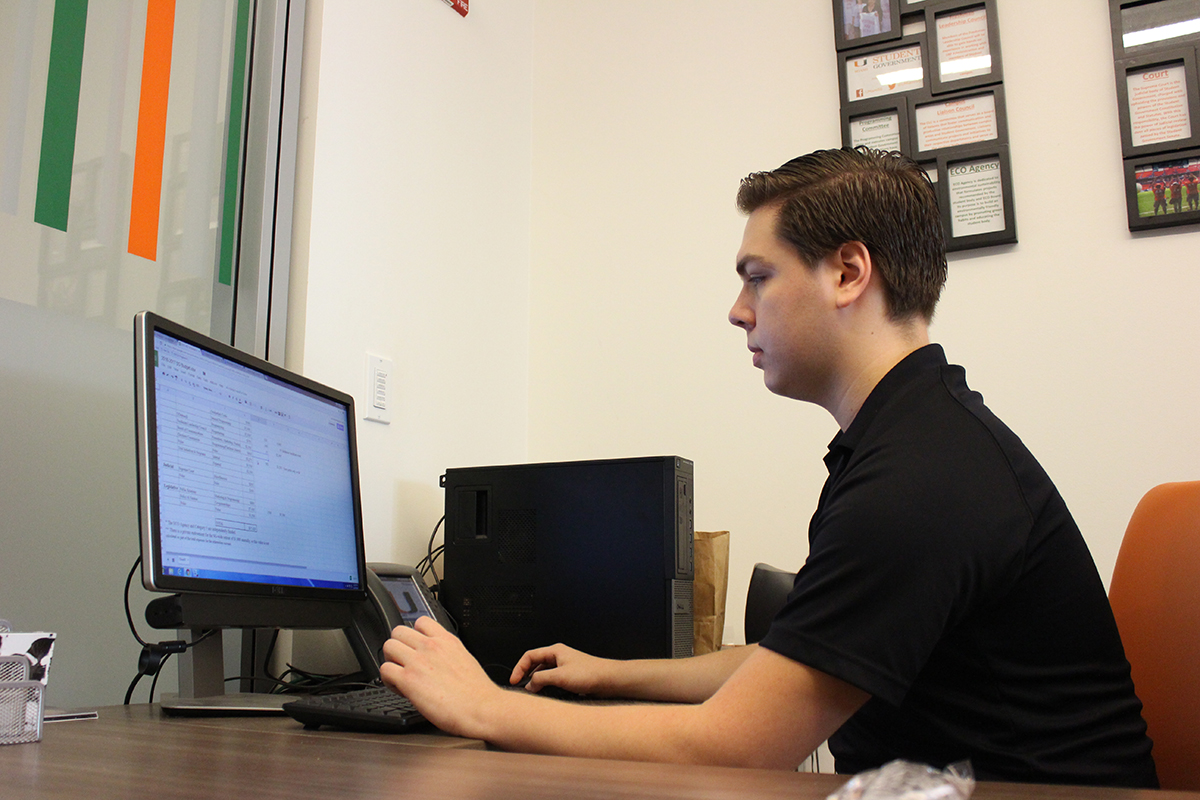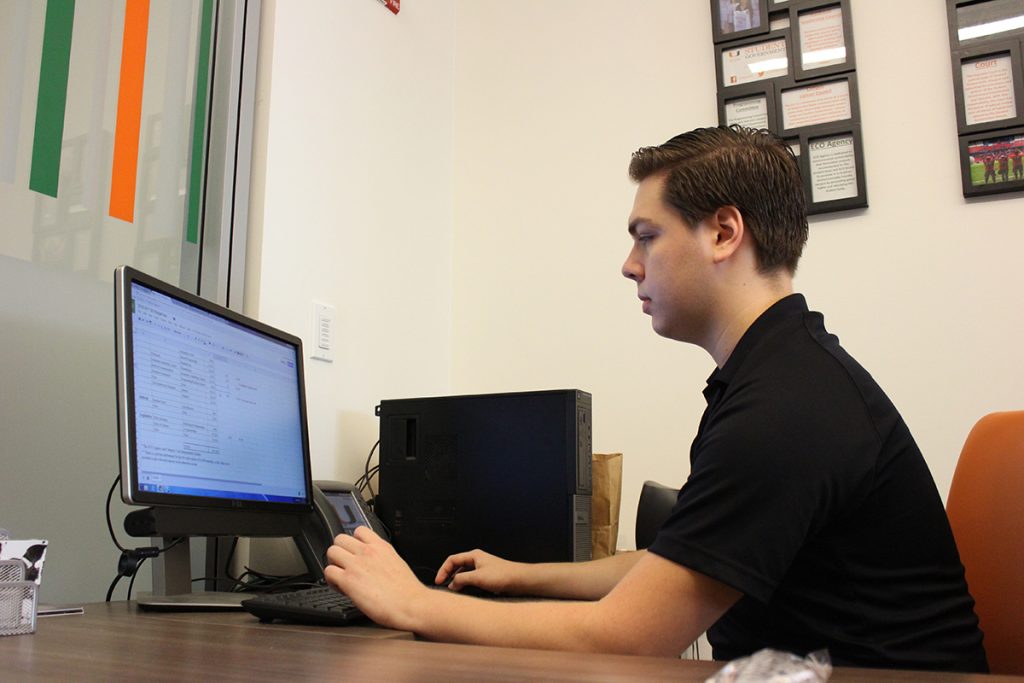

Senior Robert Renfro spent the summer preparing for his position as Student Government (SG) executive-at-large external. When Renfro met with SG’s financial analyst to review the budget in July, it was much lower than he expected, which led to an alarming discovery: what he thought was the per-semester budget was actually the amount of money the Student Activity Fee Allocation Committee (SAFAC) allocated for the entire academic year.
Renfro, SG’s treasurer from 2015-16, immediately informed incoming treasurer, senior Morgan Owens.
“At first I panicked because I thought, ‘Well that means we must have been overspending,’” Owens said.
The students asked Ashley Langley, the financial analyst at the time, about the situation and discovered that SG had misunderstood the budget for the past three years. However, SG never overspent; if it had, the financial analyst would have stepped in and alerted the treasurer.
“As advisors, it was our job to keep a look into the account, which we did. If it was in the red, we would speak out. That never happened,” SG advisor Brandon Gross said.
Even though SG hadn’t acquired any debt, Owens said the misreading was a near-disaster that could’ve been avoided if student treasurers were able to view the active status of accounts. Access to the university’s financial account system, the Departmental Management Accounting System (DMAS), is limited to the financial advisor. Any interaction with the working budget must be done through that advisor.
SG treasurers had been basing budgets for the upcoming year on the budgets of previous years, with minor adjustments.
“When I was elected and the very first thing I had to do was prepare a budget, nobody reached out to me and said, ‘Oh, this is how much SG gets from the referendum, this is how much SG gets from SAFAC,’ other than Robert,” Owens said. “So all of that stuff is kind of just assumed to just be accurate, which is the problem.”
Gross said SAFAC funds used to be allocated on a semesterly basis but switched to annual “a few years back.”
Although Owens recognized the problems associated with giving students access to spend the account’s money, he said allowing treasurers to view the accounts is a “middle ground” that would benefit organizations.
“This sort of misunderstanding would never have happened if myself or any of my predecessors could have logged online to DMAS and said, ‘Oh, okay, we got 20 and not 40,’” he said.
Other student organizations have also complained about working off only a paper budget passed down by the previous treasurers.
Council of International Students and Organizations (COISO) President Rick Lin said he does not have access to any of COISO’s three separate accounts – SAFAC, a personal gift account where alumni donate and a budget for the annual International Week event. He said being unable to see financial records invites miscommunication and difficulty when it comes to spending.
“It just adds an extra step for students, having to go through our advisors. For COISO, when we do planned events, we are not sure how much we can spend, and it adds the extra step to go to the advisors to ask,” Lin said.
Lin said COISO was lucky that its advisors knew how to access the accounts. He said he’d heard complaints from smaller organizations that their advisors either did not know about the system well enough or were generally hard to reach.
The advisors who did not understand the system as well would have to ask the financial department for help, adding another layer that can be inconvenient in event planning, especially during tight deadlines.
“Our advisors have understanding of the system, but not necessarily all the advisors have a good understanding,” Lin said.
An example he noted was a trip COISO was planning to Sawgrass Shopping Mills. COISO needed to reserve a bus to transport 60 students for the 40-minute trip, but, per school regulations, the company needed to be vendorized – meaning the university recognizes the company and approves its services – to avoid liability issues.
Lin could not see whether his preferred bus company was vendorized; he had to wait and meet with his advisor before knowing if it was vendorized, which in certain situations could take time that students and organizations may not have.
Owens said Gross and Vice President for Student Affairs Patricia Whitely recognized the lack of access as a problem and have encouraged him to pursue a resolution. The issue is now one of Owens’s main priorities during his yearlong tenure as SG treasurer.
In early November, Owens met with Assistant Vice President for Student Affairs Gilbert Arias, who was able to explain the administration’s reasoning behind the system.
“It all has to do with controlling information and the release of information, it has to do with the confidentiality of our financial records,” Arias said.
Arias said that measures such as requiring a dual sign-in for CaneLink and preventing students from accessing financial accounts are efforts to comply with the Family Educational Rights and Privacy Act (FERPA), a federal regulation that governs the release of student information.
As students join organizations, switch leadership positions and graduate from the university, it can be difficult to ensure the security of information. The financial advisor can help continuously monitor account access regardless of member turnover, Arias said. The advisors also have a financial responsibility to ensure appropriate spending of university-allocated money.
Arias said administration encourages, but does not require, that student leaders meet regularly with their advisors to review the budget and organization spending.
“The accounts are difficult to understand,” he said. “The advisor’s role is to help guide the students.”
While Arias said he wants to make sure students aren’t seeking this access just to avoid the extra step of meeting with an advisor, he is supportive of granting access for “valid” reasons.
This change in the system would need to be implemented through the Controller’s Office, the accounting division that oversees UM finances.
Arias reached out to Gabriel Eszterhas, the university controller, and began looking into the details of potentially altering the system. He then encouraged Owens to work with other student organizations and Student Affairs to help draft a proposed procedure that would be issued to students if access were granted.
Owens is now working with Arias and other administrators to draft a procedure that would ensure information security while allowing the appropriate organization members to have access to accounts. Arias said they are hoping to implement the change sometime this year.





